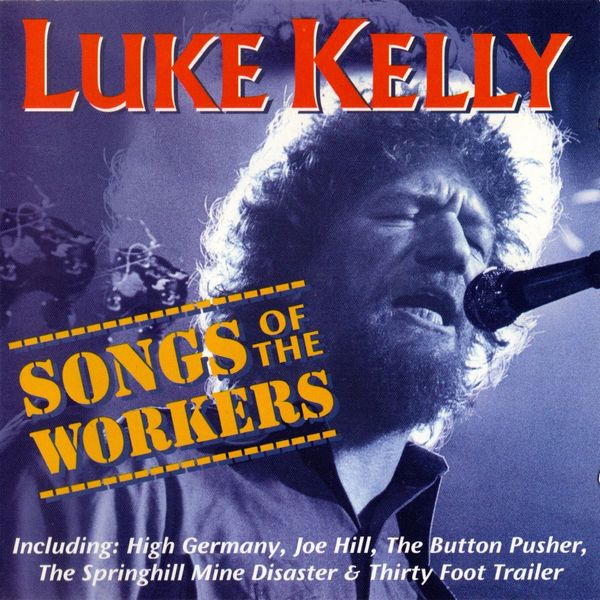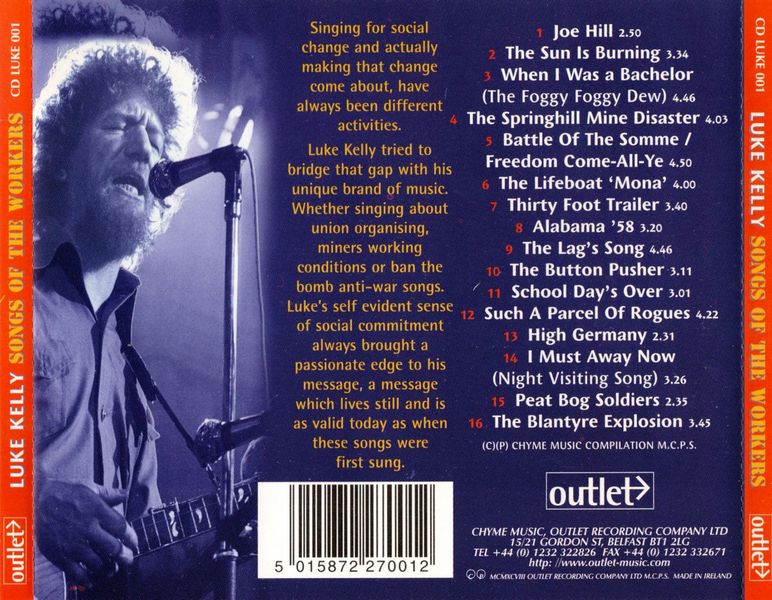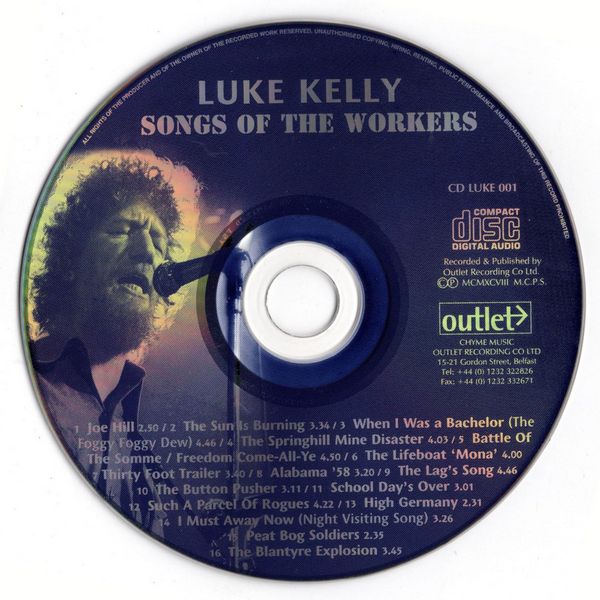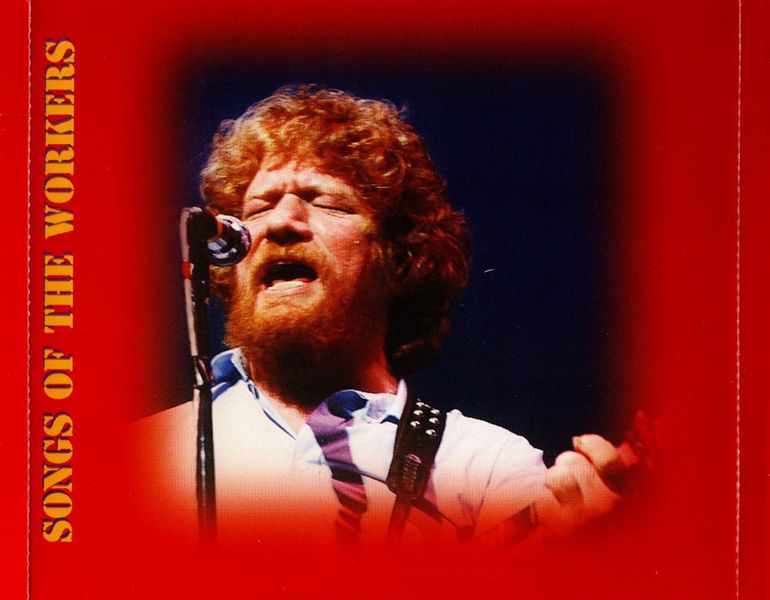

 |

|


 |
Sleeve Notes
Singing for social change and actually making that change come about, have always been different activities.
Luke Kelly tried to bridge that gap with his unique brand of music. Whether singing about union organising, miners working conditions or ban the bomb anti-war songs. Luke’s self evident sense of social commitment always brought a passionate edge to his message, a message which lives still and is as valid today as when these songs were first sung.
Luke Kelly was born In Dublin on November 1940. His father, also called Luke, worked in Jacobs biscuit factory, which was seized by the rebels in the 1916 Rising to command one of the entrances into Dublin. Luke attended St Lawrence O'Toole's Schools in the North Strand. The family though large was close; and when Luke left school at 13 years of age, he worked variously as errand boy, docker and navy. When still a teenager he emigrated, first to the Isle of Man, and then later to Newcastle-upon-Tyne..
It was in the north east of England that he came across folk clubs, a uniquely Scottish and English phenomenon. Like the traditional music sessions in Ireland, they were held in licensed premises, but unlike a traditional pub, these were clubs with a committee and members. Order was strict, customers paid an entrance fee and the clubs presented folk concerts. The members could contribute songs and tunes at the tail end of the evening..
However, generally, the more north you went, the more informal the clubs became. What was also unique was that many clubs had strong connections with left-wing political activities. They celebrated the victorious trade - union struggles, mourned the tragedies in the mines, challenged the slaughter of workers in the expansionist wars of empires and sang the solidarity of the International Brigades in Spain. Because the politics were internationalist the songs came from all over the world, especially popular were the songs and music of Woody Gutherie and Pete Seeger..
When Luke was in Newcastle in the late fifties, the political issues which dominated the folk scene were the danger of atomic war and the growing struggle for civil rights for Black Americans. However the greatest influence in Britain at that time was Ewan Mac Coll, the Scottish folk singer and song writer. Mac Coll had also written and performed agitprop theatre supporting the aspirations of organised labour. Luke met Ewan and learned from him, and in the future would record many of his songs, which some people would come to regard as the definitive versions. Mac Coll also wrote with his wife, Peggy Seeger, sister of Pete, and these songs became popularised in Luke's recordings. During this period Luke did a bit of busking and at the same time gained further insights into the ideals of socialism. He used to combine both activities selling "The Daily Worker" in the clubs and pubs, when customers would demand a song in return for buying the paper. His sales were high..
In 1960 Luke went to Birmingham to be best man at his brother's wedding. He stayed around the area for a couple of years gaining more experience in the folk clubs, especially Ian and Lorna Campbell's "Jug of Punch Club". He occasionally travelled to London to sing in Ewan Mac Coil's The Singers' Club" in Soho. Luke had by now a strong physical presence, a wild red beard and hairstyle, and a voice to match, with a performance which was as powerful as it was committed..
On his return to Ireland he met up with Ronnie Drew, Barney McKenna and Ciaran Burke. Peggy Jordan ran the Uilleann Pipers Club which Barney McKenna frequented. Peggy was also associated with the Pike Theatre where Ronnie and Luke were regulars, especially at the parties after the shows. O'Donoghue's Bar in Merrion Row was a meeting place for musicians and when the bar was closed they rehearsed there with Ciaran Burke, a regular of the pub. Peggy's' daughter sang with them for a time. As they got bookings through Peggy's influence, it became imperative they find a group name for publicity purposes. Provisionally, it was called "The Ronnie Drew Ballad Group", but Ronnie was not happy with it. Not surprisingly, for Mrs Lawlor's Ballroom in Naas advertised the group as a "Sensational Attraction: The Show Band that is going to cause a sensation in the Irish and English Dancing World in the immediate future:- The Ronnie Drew Ballet Group"! On the way to a gig in Howth, they had a row about the name. Luke, an addicted reader, "he would read wallpaper", who was trying to concentrate on his book, suggested the title of the book he was reading, if only to stop the racket. The book was "The Dubliners", by James Joyce..
They became a popular success in Ireland, and with Luke's contacts in England and Scotland, they got a booking at the Edinburgh Festival in 1963. Here they made contact with record and television producers. Back in Dublin in a concert in the Gate Theatre there was an Irish-American singer, who was also an actress, on the bill. She was called Deirdre O'Connell. Luke and Deirdre married; and she set up and ran the Focus Theatre in the city. In 1964 Luke left the Dubliners so he could carry on a solo career on the folk club circuit in England. However by the next year he was back. It was not uncommon over the years for members of the group to explore individual projects from time to time, not only musically but also in the theatre..
In 1969, Luke took time out again to play Sergeant Kite in the Dublin Theatre Festival's adaption of Farquhar's The Recruiting Sergeant". In 1971 Luke recorded with the Dubliners a song written by an up and coming songwriter, Phil Coulter, called "Free the People", a protest song against internment, imprisonment without trial. This led to cancelled bookings in England. About this time, Luke was asked what he thought about Vietnam. He replied, "I am committed to the Vietnamese people — North and South. As most reasonable Americans will say, the war should never have started. It is just plain stupid". And in his own country he advocated civil rights for all. Until his untimely death in 1984, "He stood head and shoulders above the others; he gave a voice to the unemployed, he gave a voice to the worker and gave a voice to the person on the streets of Dublin". There car be no better epitaph that the tribute his colleague Ronnie Drew paid him, "You couldn't help but respect Luke for his tremendous integrity and the way he stuck to his convictions throughout his life. As a singer he was best bar none".